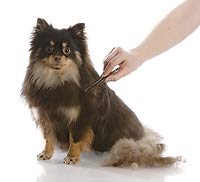“Contains natural flavors” seems all well and good when we see it on a bag of pet food, but does it mean what it sounds like, or are there other implications behind this seemingly innocuous message?
 Marketing is first and foremost in the processed pet food industry and so we see photos of vibrant colored vegetables and juicy chunks of meat, fish and fowl dripping in gravy and juices. The packaging lists all the benefits, healthy attributes and natural flavors we’ll find within. Look at pet food labels and see how many foods contain natural flavors. The FDA allows vague terminology in the labeling of many foods. Manufacturers say this vague terminology is necessary to protect proprietary tastes and smells. So what does it mean when we see these words in a pet food ingredient list? Marketing is first and foremost in the processed pet food industry and so we see photos of vibrant colored vegetables and juicy chunks of meat, fish and fowl dripping in gravy and juices. The packaging lists all the benefits, healthy attributes and natural flavors we’ll find within. Look at pet food labels and see how many foods contain natural flavors. The FDA allows vague terminology in the labeling of many foods. Manufacturers say this vague terminology is necessary to protect proprietary tastes and smells. So what does it mean when we see these words in a pet food ingredient list?
In the United States natural flavors may include any of the following:
The essential oil, oleoresin, essence or extractive, protein hydrolysate, distillate or any product of roasting, heating or enzymolysis, which contain the flavoring constituents derived from a spice, fruit or fruit juice, vegetable or vegetable juice, edible yeast, herb, bark, bud, root, leaf or any other edible portions of the plant, meat seafood, poultry, eggs, dairy products, or fermentation products thereof, whose primary function in food is flavoring rather than nutritional.
The problem is if the label says natural flavor, you do not know what that includes. The goal off adding flavorant is to mimic or enhance a natural taste and aroma. There are hundreds of natural flavors. Not all natural flavors are bad, but two of the most commonly used natural flavors in pet food are monosodium glutamate (MSG) and diacetyl.
MSG is heavily used in Asian cuisine and other foods as a flavor enhancer. MSG is a byproduct of soybean chemistry and is an excitotoxin. Excitotoxins can cause nerve and brain damage. Glutamate is a natural amino acid that functions as a neurotransmitter. When it is in excess in the body from consuming high concentrations, nerve impulses are rapidly fired to the point of exhaustion: excited to death! Many people complain they get migraine headaches from consuming foods with MSG. Many pets have unexplained agitation or discomfort, it possible that they are suffering from headache or abnormal neuro stimulation from a hidden source of MSG in their food or treats.
Diacetyl is a natural byproduct of fermentation and is also synthesized by chemical manufacturers and its safe use is controversial. Diacetyl is put in microwavable popcorn to imitate butter flavoring, in snack foods, candies and pet foods including canned foods, dry kibble and treats. At levels where diacetyl is normally present in foods, it’s safe. When diacetyl is extracted and synthesized in large volumes to become a food enhancing natural flavor, it becomes a danger to employees who inhale it and a potential danger to those who ingest the residues produced from the processing. The safety of diacetyl is dependent on the combination or proper synthesis and raw materials. If an error occurs in this process, a carcinogenic residue is produced. Exposure to flavorings using diacetyl is associated with adverse effects on the respiratory system including bronchiolitis obliterans, a debilitating and potential fatal lung disease.
 Aggressive and phobic behaviors seem to be on the rise in pets, similarly the number of canine and feline patients with nasal and oral cancers seen in veterinary practice is epidemic. To think that we may be unintentionally feeding our pets neurotoxins and carcinogens on daily basis is unsettling. What can we do to stop food manufacturers from adding natural flavors and let us know what they are? Aggressive and phobic behaviors seem to be on the rise in pets, similarly the number of canine and feline patients with nasal and oral cancers seen in veterinary practice is epidemic. To think that we may be unintentionally feeding our pets neurotoxins and carcinogens on daily basis is unsettling. What can we do to stop food manufacturers from adding natural flavors and let us know what they are?
First, read labels and stop purchasing foods with natural flavors! Certainly many natural flavors may be harmless, but until we can be assured of the presence of only true, safe, real food ingredients in our pets food, is it worth the risk to have them consume those that may have serious adverse effects? Consumer demand can change manufacturing practices and cause industrial changes much faster than government regulatory efforts. Your awareness and efforts to share your knowledge with other pet owners will quickly impact the pet food and treat industry.
 Did you know? Did you know?
• The Moab BARKery has an ingredient policy; we use this to determine if a product is an appropriate item to stock the shelves in the store. At minimum, we do not allow pet foods with corn, wheat, soy, meat meals (meals that do not identify their animal source) or by-products. We do the research for you, so you can be assured that you have quality products to choose from.
• The Moab BARKery does grooming. Grooming is available by appointment only. Call today for an appointment. All size dogs welcome.
• The Moab BARKery is moving. In February 2016, we will be moving in to our new location at 200 North 100 West (current location of Wild Rose’s Imports). We will have a larger space for grooming services, two bays for self-service dog wash and parking! The space is larger which will allow us to add new food and pet related items. In preparation for our move we have a lot of items like toys, collars, leashes and more on clearance.
|